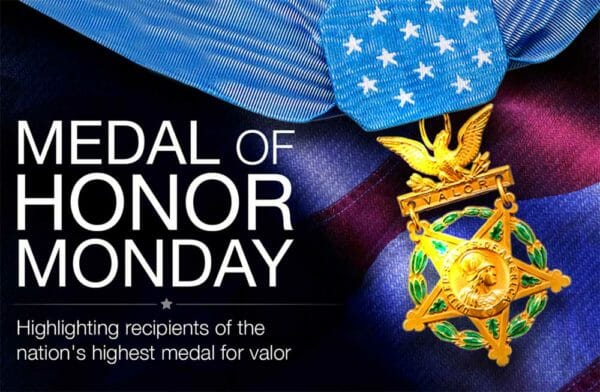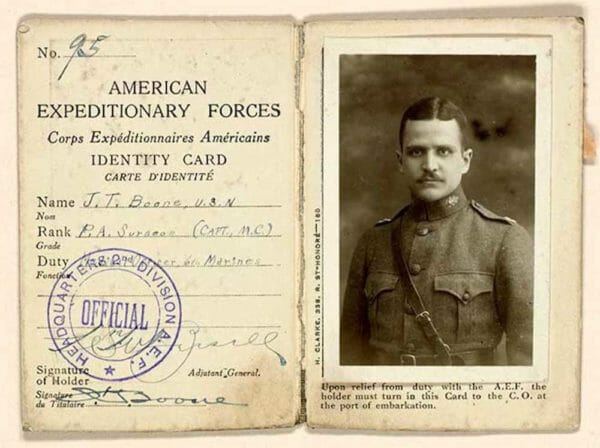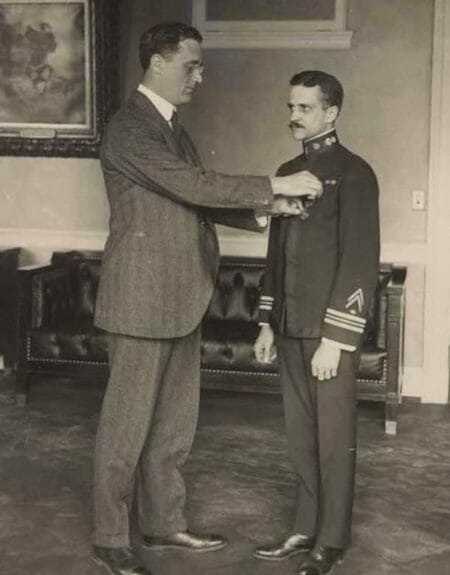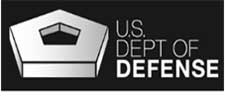By Katie Lange

USA – -(AmmoLand.com)- Navy Vice Adm. Joel T. Boone treated injured service members through the horrors of both world wars and everything in between.
He served as the personal physician for three presidents and put his mark on military medicine over the span of nearly four decades. Before earning many of his high-ranking accomplishments, though, he received one of the most memorable — the Medal of Honor.

Boone was born Aug. 29, 1889, in the small town of St. Clair, Pennsylvania, to William and Annie Boone. He had a brother and two sisters. As a teen, he went to Pottsville High School before attending prep school at Mercersburg Academy.
Boone was smart, so he chose to attend medical school at Hahnemann Medical College in Philadelphia, graduating in 1913. The following spring, he was appointed as a Medical Corps junior grade lieutenant in the U.S. Naval Reserve and spent the next year doing graduate studies at the Navy Medical School (now the Navy Medicine Professional Development Center) in Washington, D.C.
By the summer of 1915, Boone had transferred to the regular Navy and was assigned to the Artillery Battalion of the Marine Corps Expeditionary Force. He spent roughly the next year in Haiti, where U.S. Marines and sailors were helping quell anarchy and unrest after a government coup.

In April 1917, Boone received orders to the USS Wyoming. Soon after, he was temporarily promoted to lieutenant and shipped out to France to support the 6th Marine Regiment during World War I. Boone spent 17 months at war, participating in major campaigns like the Battle of Verdun, the Meuse-Argonne Offensive and the Battle of Belleau Wood — which, at the time, was considered the bloodiest Marine conflict in American history.
According to the Library of Congress, Boone worked 12-hour days during Belleau Wood to treat the injured near the fighting. He also helped set up a field dressing station on a nearby farm. According to the Library of Congress, Boone’s journal said that he and other corpsmen suffered through three gas attacks and artillery barrages that caused their housing to shake and the ground to “pulsate.”
Boone’s actions during the conflict later earned him the Medal of Honor.
On July 19, 1918, then-Lt. Boone was in the thick of a firefight with the Germans near Vierzy, France, about a half-hour north of the town of Belleau. Boone knew his men were falling left and right on the battlefield, so, despite the intense enemy gunfire and gassings, he left the relative safety of a ravine and ran onto the open field to give first aid to wounded Marines.
When he ran out of field dressing and supplies, Boone again dodged his way through heavy shelling to replenish them. He returned as quickly as he could with a sidecar full of supplies and continued to help the wounded. Later that day, he made another resupply run under the same conditions.

Later that year, Boone received a temporary promotion to lieutenant commander. He returned to the U.S. in 1919 and was awarded the Medal of Honor, which was pinned to his uniform by Assistant Navy Secretary Franklin D. Roosevelt.
Boone remained in the Navy after the war and made a name for himself. He and his wife, Helen, had a daughter in early 1920 while Boone was detailed to the Surgeon General’s Office in Washington, D.C. At the same time, he was chosen to be the director of the Bureau of Navy Affairs at American Red Cross headquarters.
In June 1922, Boone was permanently promoted to lieutenant commander and assigned as the medical officer on the presidential yacht, the USS Mayflower. The ship was where many diplomatic and social events occurred for presidents Warren G. Harding and Calvin Coolidge.
Boone remained in that position for several years until 1929, when newly elected President Herbert Hoover decommissioned the yacht as a money-saving measure. At that point, Boone was assigned to the White House to continue his services as Hoover’s personal physician.
Over the next 15 years, Boone furthered his studies in medicine and worked his way up the ranks. During World War II, he served on ships and at naval bases on the West Coast.
According to his obituary in The Pottsville (Pennsylvania) Republican, Boone was the fleet medical officer on famed Adm. William Halsey’s staff and was aboard the USS Missouri during the Japanese surrender ceremonies on Sept. 2, 1945. Boone was also one of three officers chosen to liberate Allied prisoners of war in Japan before the U.S. military’s post-war occupation began.

According to Boone’s obituary, he was promoted to rear admiral in 1946 and served on the Hoover Commission, which made post-war recommendations to the president regarding potential changes to the federal government.
In March 1950, Boone became inspector general of the Navy Medical Department. Later that year, he advanced to the rank of vice admiral and retired after more than 35 years of service.
Boone’s work with the military wasn’t done, though. For four years, he served as the chief medical director of the Veterans Administration. Boone died on April 2, 1974, at Bethesda Naval Hospital (now Walter Reed National Military Medical Center) in Maryland. He was 84.
The doctor’s name and legacy lives on. The guided-missile frigate USS Boone that was commissioned in 1982 was named in his honor. A health care treatment facility on Joint Expeditionary Base Little Creek-Fort Story in Hampton Roads, Virginia, also bears his name.
U.S. Department of Defense
The Department of Defense provides the military forces needed to deter war and ensure our nation’s security. The foundational strength of the Department of Defense is the men and women who volunteer to serve our country and protect our freedoms. Visit www.defense.gov/ to learn more.

